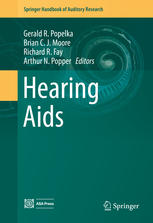

Most ebook files are in PDF format, so you can easily read them using various software such as Foxit Reader or directly on the Google Chrome browser.
Some ebook files are released by publishers in other formats such as .awz, .mobi, .epub, .fb2, etc. You may need to install specific software to read these formats on mobile/PC, such as Calibre.
Please read the tutorial at this link: https://ebookbell.com/faq
We offer FREE conversion to the popular formats you request; however, this may take some time. Therefore, right after payment, please email us, and we will try to provide the service as quickly as possible.
For some exceptional file formats or broken links (if any), please refrain from opening any disputes. Instead, email us first, and we will try to assist within a maximum of 6 hours.
EbookBell Team

4.3
68 reviewsThis volume will serve as the first Handbook of its kind in the area of hearing aid research, often the least-defined, least-understood, part of the multi-disciplinary research process. Most scientific training is very advanced within the particular disciplines but provides little opportunity for systematic introduction to the issues and obstacles that prevent effective hearing-aid related research. This area has emerged as one of critical importance, as signified by a single specialized meeting (the International Hearing Aid Conference, IHCON) that brings together specialists from the disparate disciplines involved, including both university and industry researchers. Identification of the key steps that enable high-impact basic science to ultimately result in significant clinical advances that improve patient outcome is critical. This volume will provide an overview of current key issues in hearing aid research from the perspective of many different disciplines, not only from the perspective of the key funding agencies, but also from the scientists and clinicians who are currently involved in hearing aid research. It will offer insight into the experience, current technology and future technology that can help improve hearing aids, as scientists and clinicians typically have little or no formal training over the whole range of the individual disciplines that are relevant. The selection and coverage of topics insures that it will have lasting impact, well beyond immediate, short-term, or parochial concerns.